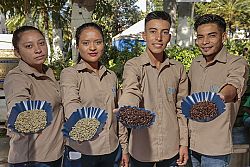CRS Rice Bowl: Story of Hope – El Salvador
Some young people in Ahuachapán in eastern El Salvador think that being a farmer is a thing of the past. Their families have farmed for generations, but climate change and soil erosion have caused harvests – and therefore, their incomes – to shrink considerably.
Edwin Carlos, a 17-year-old eager to support his parents and two little brothers, did not see farming in his future. However, after a teacher told him about how new techniques and technology were changing the way farming was being done to help restore the environment, he changed his mind. Edwin Carlos decided to join a group of 220 students who are learning skills like the importance of distancing when plowing and how burning harvest residue can harm the land and air.
Sadly, El Salvador has lost 75 percent of its rich land because of the large number of trees that have been cut down and harmful agricultural practices like the extensive use of fertilizers, making it one of the most food-insecure countries in the hemisphere. “He who knows has an obligation to act,” says Edwin Carlos, who now knows how to use water properly so that it is not wasted, and organic manure and other resources to provide nutrients to the soil to produce more – and healthier – crops.
Thanks to this school program, CRS’ Raíces Ahuachapán, Edwin Carlos has also learned how to grow vegetables at home – knowledge that was extremely important during the COVID-19 pandemic. In the days of the confinement, nearly 1,200 families started home vegetable gardens to grow nutritious foods like onions, tomatoes, cucumbers and squash. They can eat what they harvest or sell the produce at their church or the local market for additional income.
Pope Francis reminds us that “young people demand change. They wonder how anyone can claim to be building a better future without thinking of the environmental crisis.” Thanks to programs like CRS Raíces Ahuachapán, young people are becoming active agents of that change.
REFLECT
Why is caring for creation so important and what is the impact – locally and globally – when we don’t care for it?
Raíces is a word in Spanish that means roots. Why do you think the program is called that?
© Copyright 2024 The Diocese of Salt Lake City. All rights reserved.


Stay Connected With Us